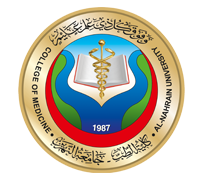|
Vol. 20 Issue 1 January - June / 2022
Published on website | Date : 2022-04-12 11:46:43
Neonatal Outcomes in Gestational Diabetes MellitusGhader M. Rashed, Areej A. Al-Omrani, Zahoor A. Mohmmed, AbdulKarem J. Al-BahadleAbstractBackground: Gestational diabetes mellitus (GDM) is a common and serious maternal complication, in which hyperglycemia develops at any time during pregnancy due to progressive insulin resistance. It affects about 14% of pregnancies worldwide. There are many adverse effects of GDM that compromise the fetus and neonate.
Objective: To compare neonatal outcomes according to type of treatment for GDM. Methods: A prospective study conducted at the Department of Pediatrics, (Neonatal Intensive Care Unit; NICU) and Obstetric in Al-Imamein Al-Kadhimein Medical City in Baghdad during a period from 1st of march 2019 to 1st of January 2020. The study included 100 neonates delivered by mothers with GDM, divided in to four groups according to their mothers' therapy; (diet group: 18 neonates, metformin group: 36, insulin group: 26, mixed group: 20). Results: Neonates in metformin group had a higher chance of having normal birth weight comparing with others, but neonates in insulin group have higher percent of prematurity, macrosomia, large for gestational age or small for gestational age, hypoglycemia and jaundice among others. No significant statistical difference between metformin and insulin, in mode of delivery, Apgar score, respiratory distress syndrome, hypocalcaemia, anomalies, and NICU admission but can occur more in insulin group. Conclusion: Metformin was able to reduce the risk of neonatal complications, therefore, it can be a good alternative for insulin in the treatment of GDM. Keywords: Gestational diabetes mellitus, macrosomia, metformin, insulin Citation: Rashed GM, Al-Omrani AA, Mohmmed ZA, Al-Bahadle AJ. Neonatal outcomes in gestational diabetes mellitus. Iraqi JMS. 2022; 20(1): 59-67. doi: 10.22578/IJMS.20.1.8 Full-text |
Some tools below are only available to our subscribers or users with an online account |
 |
Please wait until the current process completes ... |



